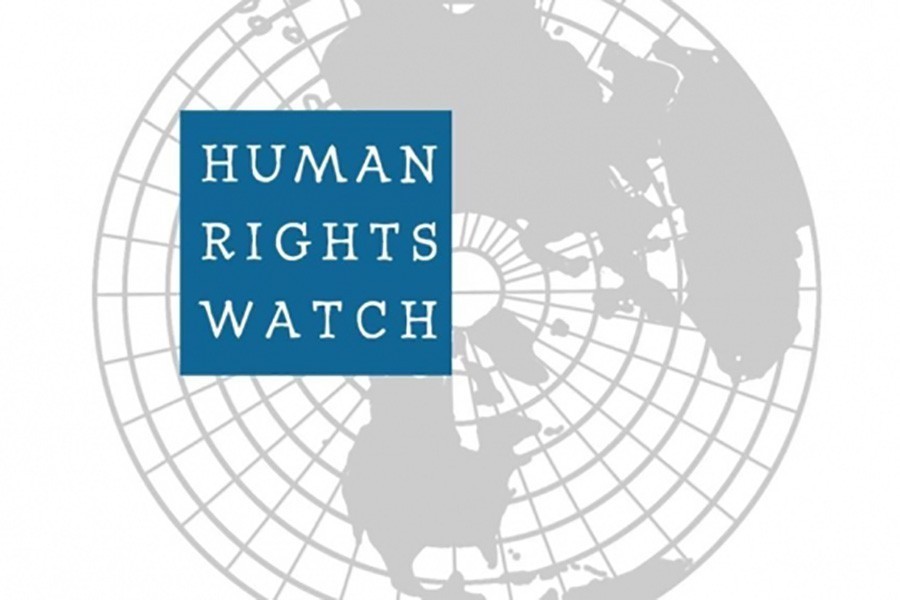HRW asks Myanmar to end harassment of Rakhine media outlets

Published :
Updated :

Human Rights Watch (HRW) has called on Myanmar authorities to stop using criminal laws, website blocks, and licensing delays to severely restrict the two ethnic media outlets in Rakhine State.
The international rights organisation, in a statement on Tuesday, said the authorities have filed charges against Aung Marm Oo, chief editor of Development Media Group (DMG), under the rights-abusing Unlawful Associations Act, blocked access to the outlet’s English and Burmese language webpages, and failed to act on DMG’s application to renew the publishing license for its bimonthly print journal.
Narinjara News, the other ethnic Rakhine media outlet, has also been blocked since March, the statement pointed out.
“The Myanmar authorities’ relentless harassment of ethnic Rakhine news outlets is an outrageous assault on media freedom and the right to information,” said Linda Lakhdhir, Asia legal adviser.
“The authorities should immediately drop the baseless charges against DMG’s chief editor, renew the company’s publishing license, and unblock the websites of both DMG and Narinjara News.”
The Myanmar government has repeatedly used draconian laws against journalists for reporting on military abuses or ethnic armed groups.
In 2018, two Reuters journalists were sentenced to seven years in prison under Myanmar’s Official Secrets Act after uncovering a massacre of Rohingya Muslims. They were released on a presidential pardon after spending more than a year in jail. The two reporters won the Pulitzer Prize for their reporting on that story.
Because of fighting in Rakhine State and the increasing Covid-19 cases in the state capital, Sittwe, and surrounding areas, timely and accurate information about local conditions is crucial. The government restrictions on DMG and Narinjara News are an unjustifiable interference with media freedom and the right to information, said HRW.
The general election scheduled for November 8, 2020, heightens concerns about the media blackout.
On May 1, 2019, Aung Marm Oo learned that the Myanmar police had filed charges against him under section 17(2) of the Unlawful Associations Act, which provides a penalty of up to five years in prison for anyone who “manages or assists in the management of an unlawful association, or promotes or assists in promoting a meeting of any such association, or of any members thereof.”
Aung Marm Oo, who has been in hiding since learning of the case, said that the police never provided him with any written notice detailing the grounds for the charges. He believes the charges are linked to the media group’s legitimate reporting on the conflict between the Myanmar military and the Arakan Army ethnic armed group.
On May 8, 2019, DMG sent a letter to the Myanmar Press Council, an independent body tasked with resolving disputes with the media, asking it to intervene in the case. The Press Council has yet to respond, the media group said.
Meanwhile, police have interrogated multiple members of Aung Marm Oo’s family and DMG employees.
On March 23, 2020, the Myanmar government designated the Arakan Army a terrorist organisation under the Counter-Terrorism Law and as an “unlawful association” under section 15(2) of the colonial-era Unlawful Associations Act, a vaguely worded law that has frequently been used by the Myanmar authorities to arrest and detain ethnic minority civilians in conflict-affected areas.
In April, the Myanmar government detained Nay Myo Lin, editor of Voice of Myanmar, for more than a week and charged him under the Counter Terrorism Law for publishing an interview with the Arakan Army spokesperson. The court rejected the case and ordered him released. However, use of this rights-abusing law against journalists, which carries a penalty of up to life in prison, has a serious chilling effect on reporters seeking to report on the conflict.
“The government has frequently charged journalists who are bravely covering fighting in Rakhine State and other conflict areas to hide military abuses from the public,” Lakhdhir said. “All journalists, whatever their perspectives, need to be able to report freely without fear of reprisals.”
sajibur@gmail.com


 For all latest news, follow The Financial Express Google News channel.
For all latest news, follow The Financial Express Google News channel.